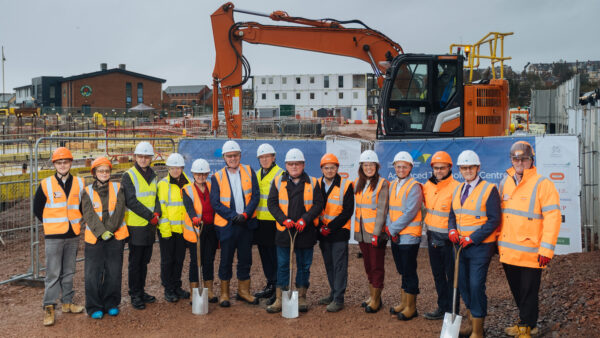An employment tribunal has found that Falcon unfairly dismissed a crane operator following the collapse of a crane at a construction site in Edinburgh two years ago.
The crane operator, named as G Shields in the judgment, has been awarded more than £29,000 after the tribunal concluded his dismissal had been “substantively unfair” and there hadn’t been an effort on Falcon’s side “to investigate anything [Shields] said”.
On 28 November 2023, the jib of a Jaso J380PA luffing crane owned and operated by Falcon Tower Crane Services fell onto a residential site in Steads Place, developed by Collab Construction.
The crane operator was hurt in his shoulder. No one else was injured.
Shields, a father of two from Glasgow, had been working for Falcon for almost 20 years when the accident happened and was “one of [Falcon’s] most experienced crane operators”, the tribunal found.
Out-of-service safety feature
The crane, which had a tower height of 21m and a jib length of 65m, was fitted with a park radius device that placed the crane out of service as a safety feature when operated.
The tribunal heard that Shields placed the crane in the out-of-service position on 27 November, the day before the crane collapse, when it was getting dark.
When he did so, he sought to operate that safety feature on one occasion. He was not aware that damage may have been caused to the crane when operating that device.
The tribunal found that there was no discussion that day between Shields and anyone else regarding any damage to the crane, including the crane supervisor employed by Collab, with whom Shields had communicated regarding site logistics.
However, the tribunal found that during the Falcon’s disciplinary process, the company’s health and safety manager “appeared to believe that [Collab’s crane supervisor] and [Shields] had conspired to agree how they would continue to operate on site with the damaged crane and not report damage”.
‘He knew a damaged crane could risk life’
On the day of the accident, Shields climbed up the crane and informed the crane supervisor that he would need 15 minutes to carry out routine checks, which was his standard practice before starting operations.
While carrying out the inspections, Shields did not see any damage to the crane. The tribunal found that had he done so, he would have reported the damage to Falcon and not operated the crane.
“[Shields], as an experienced crane operator, knew that he should report
any damage to a crane to [Falcon],” the tribunal said. “He also knew that operating a damaged crane could risk his life and that of all other individuals on the site.
”If [Shields] reported any damage to a crane, he would continue to be paid
while any damage was repaired. [Shields] has two children and would not
have risked his life and that of others by knowingly operating a damaged crane.”
Shields started work under the direction of Collab’s crane supervisor. On the third lift he carried out, the crane’s jib collapsed.
Shields immediately contacted his line manager at Falcon by video call to tell him what had happened and took photographs of the scene. He then went to hospital to attend to his injuries.
The tribunal heard that Shields was diagnosed with post traumatic stress disorder because of the incident. He experiences flashbacks and nightmares and has developed a fear of heights.
‘No attempt to check employment record’
Falcon took a statement from Shields in the immediate aftermath of the incident, but the document was not produced to Shields during the disciplinary process, or to the employment tribunal.
Employment Judge Amanda Jones found that the company’s managing director, Andrew Brown, had concluded “at an early stage” that Shields was responsible for the crane’s damage, and he must have known about it before operating it the day the accident happened.
During Shield’s disciplinary hearing on 21 June 2024, Falcon’s health and safety manager, Bradley Rix, said that the company had not been able to provide Shields with the reports which had been produced relating to the accident or the pictures or video which had previously been shown to him “as they were too confidential”, although one of the reports had been sent to Falcon’s clients in December 2023 by email.
“There was no good reason why these reports could not have been provided to [Shields] on a confidential basis in advance of the hearing,” the tribunal found.
65mph winds on site
During the disciplinary hearing, Shields indicated that he understood that the park radius device had been reconfigured and that there had been 65mph winds on the site the week before the accident.
Shields offered Falcon these suggestions as potential contributory factors to the damage to the crane having occurred, and added that although there had been a recent inspection of the crane, the park radius device had not been inspected.
Falcon was asked to check the CCTV footage of the inspection, which was said to have taken place during the inspection, together with various other pieces of information, but it did not do so.
“[Falcon] did not carry out any investigations into the issues [Shields] raised during this hearing. There was no attempt to check [Shields’] employment record, whether in terms of length of service or safety record,” said the tribunal.
Less than two months after this accident, another Falcon crane collapsed on a site in London. No injuries were reported.
The tribunal said: “The collapse of a crane is an unusual event and the collapse of a second crane operated by [Falcon] in a short period of time placed additional pressure
to explain why both this and the incident of 28 November 2023 had occurred.”
‘Impressive witness’
A Health and Safety Executive (HSE) investigation into the crane’s collapse found that “the most likely cause of the failure appears to have been the damage to the jib due to operator error […] However, no failure or damage was reported by Mr Shields, and the components were recorded as working correctly at the service inspection.
“It cannot be positively determined whether the components’ failure [was] prior to, or as a result of the damage to the jib and the subsequent crane collapse. Witness statements obtained from operatives present at the time, do not confirm any failures of damage being noted prior to the collapse.
“However, HSE have received uncorroborated hearsay information that site personnel may have been aware that the jib was damaged and that operatives failed to report it. There is insufficient evidence to take formal enforcement action with respect to this allegation.”
Shields, who was described by the tribunal as “an impressive witness who candidly and voluntarily conceded that it was the accident which had caused him to be unable to obtain alternative employment and not his dismissal by [Falcon]”, has not worked since his dismissal and has not applied for jobs due to his health.
He is now in receipt of universal credit and adult disability payment.











